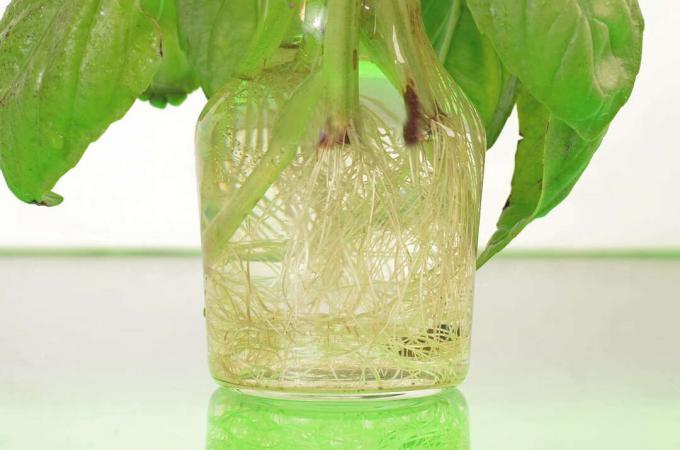Boring herbs on the windowsill? Not with us! These seven varieties are real eye-catchers on the windowsill - they do not need any soil at all.

Fresh herbs are something nice - especially when they come straight from your own window sill. But did you know that you can also grow plants without soil? The whole thing is called hydroponics and is currently all the rage. What sounds complicated is actually quite simple: some plant species can do without soil at all because they simply absorb the nutrients they need from the water. The plants not only look particularly interesting, but are also easier to care for. You only have to check the water level regularly and add liquid fertilizer or change the water from time to time. Here we show you which types of herbs are particularly suitable for cultivation in water.
contents
- 7. basil
- 6. oregano
- 5. rosemary
- 4. mint
- 3. lemon balm
- 2. Stevia
- 1. sage
7. basil
basil (Ocimum basilicum) is probably one of the most popular kitchen herbs in Germany. So why not put it in the limelight with a hydroponic system? To do this, take a healthy basil plant that has not yet bloomed and remove it
cuttings. In order for the basil to form good roots in the water, the cutting should be cut off just below a leaf node. Now remove all but the top three or four leaves. Basil will grow and thrive in a glass of water in a bright place if you only change the water every few days.
6. oregano
Whether with pizza, pasta or meat: oregano (Origanum vulgare) is a real all-rounder. So it cuts just as good a figure in the water as it does in the ground. Simply cut off a few young shoots and place them in the water. The most important things for the oregano are the right temperature and lots of sunlight. A room temperature of around 20°C and a place by a sunny window are ideal for the oregano to develop. Here, too, the water should be changed regularly.

5. rosemary
the spicy one rosemary (Rosmarinus officinalis) is not only an ideal candidate for the kitchen, but also does well in water. To do this, cut cuttings about 10-15 cm long and remove the lower needles. Now the rosemary can already soak in the glass. But don't worry if it takes a while for the first roots to appear: the woody rosemary cuttings are among the more comfortable colleagues. In a sunny place and with regular water changes, rosemary also grows without soil and end.

4. mint
mint (mentha) is not only delicious, it also smells fresh and delicious. So is there a more ideal houseplant? In addition, you can easily breed them in water. Separate a few shoots and remove the lower leaves from the cuttings. Now the mint only needs water and sunlight. The warmer it is in your area, the faster the first small roots grow: under ideal conditions, it can only take a few days before you see the first successes.

3. lemon balm
lemon balm (Melissa officinalis) in the house is always a good idea: Not only does the plant smell wonderfully fresh and it is perfect as a spice for many dishes. The aromatic smell is also a real mosquito repellent. In order to be able to grow lemon balm in water, it is best to choose healthy, green stalks. Again, you should remove the lower leaves and then place the plant in water. Lemon balm is particularly sensitive when it comes to stagnant water: Regular changing is therefore a must for healthy lemon balm.

2. Stevia
known Stevia (Stevia rebaudiana) mainly as a sugar substitute and not as a plant. Stevia is a perfect choice to refine a dish with natural sweetness. For successful cultivation in water, the shoots of the plant should still be quite young before they find their way into the glass as cuttings. Stevia likes particularly bright and warm rooms, which is why a place in front of a sunny window is ideal. Here the plant can thrive and bear its sweet harvest.

1. sage
As a tea or as a spice sage (Salvia) well known. But did you know that you can also grow the green leaves without soil? It is best to cut off the young sage shoots in spring and remove the lower leaves. Now the plant only needs regular fresh water (otherwise mold can quickly develop) and a bright spot. Soon you will not only have an eye-catcher in the kitchen, but also always a fresh supply of sage leaves.

Of course, all these herbs are also happy about a place in the bed or flower pot. Above all, if larger quantities are to be harvested, growing in water is not perfectly suitable.
With our Plantura herb growing set Herb cultivation is also child's play. The set contains everything you need for successful cultivation - seeds, cultivation pots and substrate, as well as practical plant signs and a mini greenhouse. You can soon look forward to a rich herb harvest.



